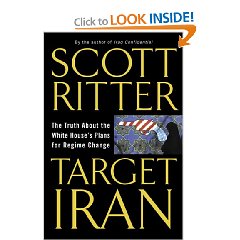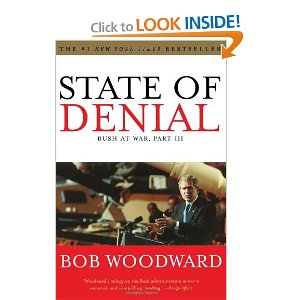 Microcosmic Partial Picture in the First Person,
Microcosmic Partial Picture in the First Person,
L. Paul Bremer III
I took great care to read this book slowly. See my list on Iraq Evaluations.
Bremer is clearly a decent man, hard-working, totally clueless about Middle Eastern and military affairs, and put in a no-win situation by George Bush and Dick Cheney. Bremer bugged out after a year, and now, two years later, the Administration we have a quagmire and a possible attack on Iran building up.
Quite incredulously, for me at least, Bremer actually sees Iraq as the crux of the Global War on Terror (GWOT) and yet is totally oblivious to the fact that we created this battlefield opportunity for Iran and Al-Qaeda. See At the Center of the Storm: My Years at the CIA
Early on the book makes it clear that Iraqis were delighted to be liberated, dismayed at the occupation, and completely unable to agree among themselves about how to achieve a legitimate government capable of stabilizing and reconstructing the country.
This is a very self-serving book, extraordinarily selective in its recollections. A few things that really struck me:
1) This book starts without reference to the path to war paved by lies from the Vice President and other members of the Bush “team.” It begins by saying that it was “widely accepted” that Weapons of Mass Destruction were the proper cause of the invasion. BALONEY. See instead Weapons of Mass Deception: The Uses of Propaganda in Bush's War on Iraq and Failed States: The Abuse of Power and the Assault on Democracy
2) There is ZERO discussion in this book of the massive role played by Halliburton, Bechtel, and others. There is ZERO discussion of the 18 billion dollars he had to work with and managed to lose, completely apart from the contracting. There is ample discussion about the pretense of progress, but ZERO discussion about the thousands of contracting failures, the abysmal failure of the entire reconstruction effort. See Crossing the Rubicon: The Decline of the American Empire at the End of the Age of Oil, Squandered Victory: The American Occupation And the Bungled Effort to Bring Democracy to Iraq and a host of other books on our failures there, such as Fiasco: The American Military Adventure in Iraq
3) There is a lot of blame to direct elsewhere, clearly justified but not at all making up for the fact that Bush-Cheney lied to America and the world and created this mess:
a) Chalabi was a constant irritant, obstruction, and general twit. This is the man who was fired by CIA for being a thief and a liar, convicted in Jordan of bank fraud, and still allowed by the US to be very active in Iraq.
b) Wolfowitz's rosy predictions are labeled as “fantasy,” and the author on more than one occasion talks about Doug Feith in a manner that is the diplomatic equivalent of General Frank's blunt statement in his own book: “the dumbest bastard on the planet.” See Tommy Franks “American Soldier.”
c) The Governing Council created early on was lazy, working quarter days four days a week. They simply did not compute the demand for hard serious work.
d) He takes General Jay Garner to task for allowing looting (ultimately 17 of 20 Ministry headquarters buildings were completely looted, as well as electrical and water plants and petroleum pumping stations), and also calls General Garner's 15 May turn-over plan a reckless fantasy. I posit instead that the neo-cons were sucked in by Iranian agent Chalabi and never realized how deep they were into fantasy land. I think Garner was close to getting it right early on.
e) He very properly points out that he inherited a deep structural crisis, a country coming off fifty years of neglected infrastructure, with virtually every sector of society dysfunctional. For context see The Fifty-Year Wound: How America's Cold War Victory Has Shaped Our World and The Sorrows of Empire: Militarism, Secrecy, and the End of the Republic (The American Empire Project)
f) The CIA and the Marines shut down his attempt to arrest Muqtada Al-Sadt, the Shi'ite cleric that has since then completely disrupted the country.
g) On more than one occasion the Spanish Army elements refused to fight and refused to follow direction. The Ukrainians also come in for direct criticism from Bremer.
There are a number of absolutely fascinating tid-bits, a few of which are listed here:
1) The Iraqi military had 16,000 generals while the US military (all of it, worldwide) has only 300.
2) The military consisted largely of Sunni officers who abused enlisted Shi'ite soldiers.
3) Saddam Hussein had implemented virtual starvation genocide against the Shi'ites, with severe malnutrition being the norm within that majority.
4) Because of the complete breakdown of all sanitation measures, he estimates that 500,000 tons of human waste each day were dumped into the two rivers.
5) Hussein printed money with inflation up to 100,000 per year–at the same time, 50% of all Iraqis said by the author to be unemployed when he arrived. [On this later point, he does not address the fact that the contractors received billions and instead of employing Iraqis, imported many other nationalities as slave wages.]
6) In his view, there were three sources of instability: looters, die-hard Bathists, and the Mukhabarat paramilitary.
7) Saudi Arabia was known to be egging the Sunnis on and in my view; this makes the Iranian interest in Shi'ite self-preservation completely appropriate. The author also notes that Syria and Lebanon were training and sending in foreign fighters (in the low thousands). Saudi Arabian royalty is EVIL. See See No Evil: The True Story of a Ground Soldier in the CIA's War on Terrorism and also Sleeping with the Devil: How Washington Sold Our Soul for Saudi Crude
8) The author blames the French (and to a lesser degree the Russians) for keeping Saddam Hussein in power, while making no mention at all of the strong support provided by the USA to Saddam Hussein in his genocide against the Kurds and his genocidal chemical war with Iran.
9) On an extremely important point, I found it beyond belief that the author, the “Viceroy” was put into Baghdad without a command & control communications and computing set of vans, tents, generators, and so on. The military incapacitated him with quiet scorn.
The author claims in this book that the insurgency was “largely unpredicted” (page 223) and this is of course not true. However, I do believe him when he says he tried over and over again to get Washington and the military to take the insurgency seriously. His problems with Washington are very similar to those described by General Wesley Clark in Waging Modern War: Bosnia, Kosovo, and the Future of Combat
The author has 164 references to Bush and only 26 to Cheney. He really did deal with the President on many matters after the fact, but I credit Dick Cheney will totally trashing our entire global program. See Vice: Dick Cheney and the Hijacking of the American Presidency
The author has good things to say about the World Bank (this is prior to Wolfowitz taking it over). They completed 15 assessments in six weeks instead of six months, and were very helpful.
There are only 12 mentions of Iran in this book. That is the epitaph for our failed invasion and occupation of Iraq. Iran wins, we lose.
 Click Here to Vote on Review at Amazon,
Click Here to Vote on Review at Amazon,
on Cover Above to Buy or Read Other Reviews,
I Respond to Comments Here or There











